Wednesday, December 24. 2008
Auch dieses Jahr wieder tuXmas
Die Linux User Group Backnang hat, wie auch in den letzten beiden Jahren, zu Weihnachten eine DVD herausgebracht, die vollgepackt ist mit freien und frei kopierbaren Inhalten aus dem Netz. Die Idee dabei ist, durch eine möglichst vielfältige Auswahl auf die große Menge freier Inhalte aufmerksam zu machen.
Im Gegensatz zu den Vorjahren war ich dieses Mal daran kaum beteiligt. Umso mehr freut es mich, dass es auch ohne mich geklappt hat. Also viel Spass mit der tuXmas DVD 2008.
Im Gegensatz zu den Vorjahren war ich dieses Mal daran kaum beteiligt. Umso mehr freut es mich, dass es auch ohne mich geklappt hat. Also viel Spass mit der tuXmas DVD 2008.
Posted by Hanno Böck
in Books, Computer culture, Copyright, Linux, Movies, Music
at
19:38
| Comments (0)
| Trackbacks (0)
Wednesday, December 17. 2008
Interview on FSFE webpage
Posted by Hanno Böck
in Computer culture, Copyright, English, Gentoo, Linux, Politics
at
17:28
| Comments (0)
| Trackbacks (0)
Saturday, December 13. 2008
A critique on the FSFE campaign on PDF readers
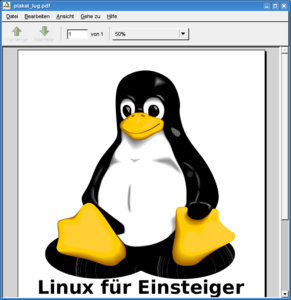 The Free Software Foundation Europe has recently started a campaign promoting free PDF readers. The idea is to replace the tons of »Get Adobe Reader to view the PDF«-Buttons with ones that don't promote a proprietary product for viewing PDFs. On the page, they list a couple of free PDF readers for various operating systems.
The Free Software Foundation Europe has recently started a campaign promoting free PDF readers. The idea is to replace the tons of »Get Adobe Reader to view the PDF«-Buttons with ones that don't promote a proprietary product for viewing PDFs. On the page, they list a couple of free PDF readers for various operating systems.While I fully support the intention of this campaign, I think there's a big strategic misconception. As a small sample, let's take this PDF (an old advertisement for a Linux installation party). It's created with Scribus, based on a transparent SVG tux image I got from Wikipedia. On the right, you can see the PDF rendered with Evince (one of the three Linux-based solutions listed there). The others (kpdf and okular), although based on the same poppler-libarary, show a different rendering, though it's not better.
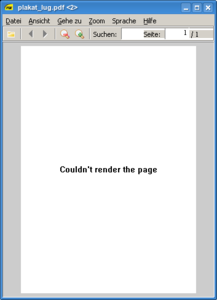 Loading the same PDF in the only listed Windows program SumatraPDF (which will, sad but true, probably the one most people will look for) gives an even more interesting result (see on the left). Though, after resizing the window, it changes it's opinion and renders the PDF, although still broken as you can see on the right (results may be false as I only tried it in WINE).
Loading the same PDF in the only listed Windows program SumatraPDF (which will, sad but true, probably the one most people will look for) gives an even more interesting result (see on the left). Though, after resizing the window, it changes it's opinion and renders the PDF, although still broken as you can see on the right (results may be false as I only tried it in WINE).Continuing with the problems, SumatraPDF is unable to fill in PDF forms. Luckily today Linux-based PDF readers are able to do that, though one of the listed programs (kpdf) is not.
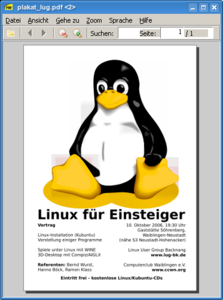 In fact, those are no reasons not to start a campaign for free PDF readers. But it should start with a completely different focus, like »we have some coders wanting to improve free PDF readers, send us your wrong rendered PDFs« or something like that. And then start improving the free PDF readers. And then promote them. Doing it the other way round with a »there is no problem, just take a free PDF reader« message and then giving them ones with grave problems is just lying to people. There's a good reason why for example the Scribus project promotes the Adobe Reader.
In fact, those are no reasons not to start a campaign for free PDF readers. But it should start with a completely different focus, like »we have some coders wanting to improve free PDF readers, send us your wrong rendered PDFs« or something like that. And then start improving the free PDF readers. And then promote them. Doing it the other way round with a »there is no problem, just take a free PDF reader« message and then giving them ones with grave problems is just lying to people. There's a good reason why for example the Scribus project promotes the Adobe Reader.Oh, and before you ask, yes, I have reported the bug about the misrendered transparency a long time ago.
Posted by Hanno Böck
in Code, Copyright, Linux
at
13:35
| Comments (0)
| Trackbacks (0)
Defined tags for this entry: adobe, evince, freesoftware, fsfe, kpdf, okular, pdf, poppler, sumatrapdf
Monday, October 6. 2008
Lenovo, Linux and Windows refunding
Recently there were some News that Lenovo does not like Linux any more. This was supported by comments like this at Lenovoblogs (by a Lenovo engineer):
»Again, what’s the incentive for us to start providing all of this intellectual property for free to the Linux community? You may say it drives support for Linux on ThinkPads and people would buy more ThinkPads as a result. I think that’s a dubious assertion at best.«
(the subject was driver support for switchable graphics on modern thinkpads and brings up some common urban legends about linux and driver support)
Sadly, I experienced one more place where Lenovo seems to shift away from a Linux friendly viewpoint: I tried to return the windows license of my new Thinkpad with a pre-made form by Lenovo itself (I got this from someone else by eMail, not from Lenovo directly). In the net, you can find tons of reports that it was easy for people to get money back for their windows licenses by Lenovo.
Though what I got was this:
»Leider können wir Ihrem Wunsch nach Rückerstattung der Kosten für das auf Ihrem Lenovo Produkt vorinstallierte Microsoft-Betriebssystem nicht entsprechen, da das Betriebssystem aus unserer Sicht einen integralen Bestandteil des jeweiligen Lenovo Produkts darstellt.«
(rough translation: We won't refund your windows-license, because we think it's an integral part of the product)
I find it hard to understand why Lenovo makes this shift. When running around on linux conferences in recent months, the number of thinkpads is hughe. While many other vendors shift to a much more free software friendly behaviour (think of AMD/ATI), Lenovo seems to go the different direction. It's especially strange because Lenovo is probably one of the few vendors that has a notable market share in the linux community.
By the way, I welcome any hints how I should continue with the windows refunding. I'd prefer not to capitulate yet (like I did with my last laptop by Samsung), and I assume the law is clearly on my side.
Update: As some of you asked, here is the form by Lenovo, though you'll probably just get the same reply I got.
Probably interesting, here you can find all EULAs from Microsoft. They are quite clear on the subject and say that you MUST return the windows license to the vendor if you don't agree to the EULA.
In the meantime, I wrote several messages about the issue to various people and instutitions. The FSFE is also working on the subject.
»Again, what’s the incentive for us to start providing all of this intellectual property for free to the Linux community? You may say it drives support for Linux on ThinkPads and people would buy more ThinkPads as a result. I think that’s a dubious assertion at best.«
(the subject was driver support for switchable graphics on modern thinkpads and brings up some common urban legends about linux and driver support)
Sadly, I experienced one more place where Lenovo seems to shift away from a Linux friendly viewpoint: I tried to return the windows license of my new Thinkpad with a pre-made form by Lenovo itself (I got this from someone else by eMail, not from Lenovo directly). In the net, you can find tons of reports that it was easy for people to get money back for their windows licenses by Lenovo.
Though what I got was this:
»Leider können wir Ihrem Wunsch nach Rückerstattung der Kosten für das auf Ihrem Lenovo Produkt vorinstallierte Microsoft-Betriebssystem nicht entsprechen, da das Betriebssystem aus unserer Sicht einen integralen Bestandteil des jeweiligen Lenovo Produkts darstellt.«
(rough translation: We won't refund your windows-license, because we think it's an integral part of the product)
I find it hard to understand why Lenovo makes this shift. When running around on linux conferences in recent months, the number of thinkpads is hughe. While many other vendors shift to a much more free software friendly behaviour (think of AMD/ATI), Lenovo seems to go the different direction. It's especially strange because Lenovo is probably one of the few vendors that has a notable market share in the linux community.
By the way, I welcome any hints how I should continue with the windows refunding. I'd prefer not to capitulate yet (like I did with my last laptop by Samsung), and I assume the law is clearly on my side.
Update: As some of you asked, here is the form by Lenovo, though you'll probably just get the same reply I got.
Probably interesting, here you can find all EULAs from Microsoft. They are quite clear on the subject and say that you MUST return the windows license to the vendor if you don't agree to the EULA.
In the meantime, I wrote several messages about the issue to various people and instutitions. The FSFE is also working on the subject.
Friday, August 1. 2008
Linux short tip: Extract icons from exe files
Recently I was asked by a friend for a linux tool to extract ressources from windows exe files, especially icons. He used a windows tool in wine till then.
I said that this shouldn't be so hard and already started writing my own parser (I came to the point where I could extract headers and content separately), when I found that there already is an appropriate tool called wrestool. It's part of the icoutils package.
wrestool -o . -x filename.exe
will extract all ressources (icons, cursors etc.) to the current directory.
I said that this shouldn't be so hard and already started writing my own parser (I came to the point where I could extract headers and content separately), when I found that there already is an appropriate tool called wrestool. It's part of the icoutils package.
wrestool -o . -x filename.exe
will extract all ressources (icons, cursors etc.) to the current directory.
Monday, July 21. 2008
OpenStreetMap Tipp: Auszug von einzelnen Orten (Murrhardt zum Download)
Ich habe heute einen XML-Auszug der OpenStreetMap-Daten von Murrhardt erstellt:
http://files.hboeck.de/osm/
Um dies vom eigenen Ort durchzuführen, erstellt man in JOSM einen Weg um den Ort. Da JOSM die Daten eines ganzen Ortes nicht performant laden kann, habe ich das Polygon mit den Landsat-Bildern erstellt und nur an einigen Orten zum Nacharbeiten die Daten geladen.
Der Weg muss die Tags polygon_file=ortsname und polygon_id=1 haben. Anschließend speichert man den Weg alleine in eine .osm-Datei. Mit dem Skript osm2poly.pl erstellt man daraus ein Polygon-File. Anschließend kann man mit osmosis und einer osm-Datei (in meinem Fall die von Baden-Württemberg, diverse Kartenauszüge gibt es hier):
java -jar osmosis.jar --read-xml file="baden-wuerttemberg.osm" --bounding-polygon file="poly" --write-xml file="murrhardt.osm"
http://files.hboeck.de/osm/
Um dies vom eigenen Ort durchzuführen, erstellt man in JOSM einen Weg um den Ort. Da JOSM die Daten eines ganzen Ortes nicht performant laden kann, habe ich das Polygon mit den Landsat-Bildern erstellt und nur an einigen Orten zum Nacharbeiten die Daten geladen.
Der Weg muss die Tags polygon_file=ortsname und polygon_id=1 haben. Anschließend speichert man den Weg alleine in eine .osm-Datei. Mit dem Skript osm2poly.pl erstellt man daraus ein Polygon-File. Anschließend kann man mit osmosis und einer osm-Datei (in meinem Fall die von Baden-Württemberg, diverse Kartenauszüge gibt es hier):
java -jar osmosis.jar --read-xml file="baden-wuerttemberg.osm" --bounding-polygon file="poly" --write-xml file="murrhardt.osm"
Wednesday, July 2. 2008
Routable OSM maps on Garmin with MapSource / WINE
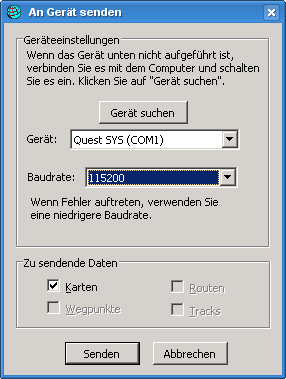 There are two tools out there for Linux to put Garmin maps (which you can convert from OpenStreetMap Data) on devices, sendmap (proprietary) and qlandkarte (free). Sadly, both don't support my device (Garmin Quest), so I had to find an alternative solution. This should also work with other garmin devices.
There are two tools out there for Linux to put Garmin maps (which you can convert from OpenStreetMap Data) on devices, sendmap (proprietary) and qlandkarte (free). Sadly, both don't support my device (Garmin Quest), so I had to find an alternative solution. This should also work with other garmin devices.After some playing around, I managed to get it running with MapSource on wine. I've used wine 1.1.0 on Gentoo, if you have problems, be sure to get a recent wine version.
Steps to do:
- Download MapSource_6137.exe from the Garmin webpage.
- Use 7-Zip to unpack the exe to some directory: 7z x MapSource_6137.exe
- Install MAIN.msi: wine start MAIN.msi
- Install MapSource: wine Setup.exe
- Get one of the MapSource Installers from here and install it: wine Setup_OSM-Germany-2008-06-11.exe
- wine doesn't support usb, so you need the garmin_gps module. If it's installed on your system, it should load automatically after attaching your device and switching it on.
- You should now have a device ttyUSB0, which you need to symlink as com1 for wine: ln -s /dev/ttyUSB0 ~/.wine/dosdevices/com1
- Run MapSource: wine ~/.wine/drive_c/MapSource/MapSource.exe
- Go to Settings -> Transfer, there you can select a serial port. Select COM1.
- Click the map selection tool from the buttons and select an area.
- Select Transfer -> Transfer to device. If everything went fine, it'll detect your garmin device attached to the serial port and you can start your upload.
Monday, June 30. 2008
OpenStreetMap in der BNN
Die BNN (Badische Neueste Nachrichten, Lokalzeitung aus Karlsruhe) interviewte mich vergangene Woche zum OpenStreetMap-Projekt.
Der Artikel ist meiner Ansicht nach recht gelungen, einzig hat sich ein Fehler eingeschlichen: Ich bin erst seit etwas mehr als einem Jahr (im Artikel wurden drei Jahre angegeben) bei OpenStreetMap aktiv.
Freundlicherweise wurde mir gestattet, den Artikel online verfügbar zu machen:
»Bald sind wir besser als jede andere Landkarte« (BNN vom 28./29. Juni 2008)
Der Artikel ist meiner Ansicht nach recht gelungen, einzig hat sich ein Fehler eingeschlichen: Ich bin erst seit etwas mehr als einem Jahr (im Artikel wurden drei Jahre angegeben) bei OpenStreetMap aktiv.
Freundlicherweise wurde mir gestattet, den Artikel online verfügbar zu machen:
»Bald sind wir besser als jede andere Landkarte« (BNN vom 28./29. Juni 2008)
Tuesday, June 10. 2008
OpenStreetMap on RTL
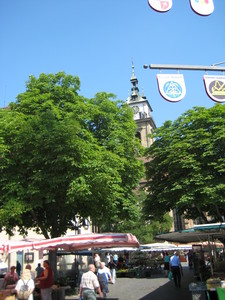 Today we met a team from the german television station RTL.
Today we met a team from the german television station RTL.They made some recordings in Bad Cannstatt and in a forest near Murrhardt. It will probably come in the »Nachtjournal«, we don't know a date yet. Hopefully the recording will be available online as well.
Update: You can now download Nachtjournal from 3th July.
Posted by Hanno Böck
in Computer culture, Copyright, English, Life
at
20:28
| Comments (4)
| Trackbacks (0)
Monday, May 26. 2008
OpenStreetMap in »Der Spiegel«
»Der Spiegel« is (cited from Wikipedia) Europe's biggest and most influential weekly magazine. In today's edition, there's a three page article about OpenStreetMap.
I wrote a while back that we met with two journalists and started mapping in the small village Kaisersbach.
Last week, there was a report in WDR (television), so we're raising interest in the mainstream media.
Update: The article is now available online.
I wrote a while back that we met with two journalists and started mapping in the small village Kaisersbach.
Last week, there was a report in WDR (television), so we're raising interest in the mainstream media.
Update: The article is now available online.
Posted by Hanno Böck
in Computer culture, Copyright, English, Life
at
13:34
| Comments (2)
| Trackbacks (0)
Sunday, May 25. 2008
OpenStreetMap at the Open Source Expo in Karlsruhe
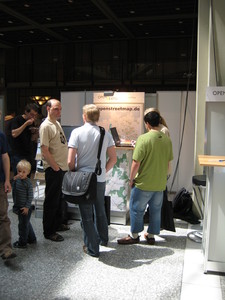 Today and tomorrow, we're presenting the OpenStreetMap-project at the Open Source Expo (or OpenExpo) in Karlsruhe.
Today and tomorrow, we're presenting the OpenStreetMap-project at the Open Source Expo (or OpenExpo) in Karlsruhe.I made some pictures, more will follow. Sadly, we didn't get a talk slot for OpenStreetMap.
Posted by Hanno Böck
in Computer culture, Copyright, English, Life, Linux
at
13:55
| Comments (0)
| Trackbacks (0)
Wednesday, May 7. 2008
OpenStreetMap im Spiegel
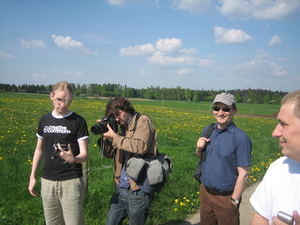 Wir (OpenStreetMap-Lokalteam Murrhardt/Sulzbach) hatten gestern Besuch vom Spiegel. Zwei sehr engagierte Journalisten begleiteten uns bei einer Mapping-Tour.
Wir (OpenStreetMap-Lokalteam Murrhardt/Sulzbach) hatten gestern Besuch vom Spiegel. Zwei sehr engagierte Journalisten begleiteten uns bei einer Mapping-Tour.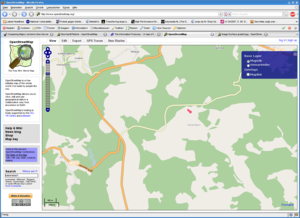 Um den Mapper-Erfolgseffekt möglichst gut darzustellen, suchten wir uns einen Ort, in dem noch fast nichts gemappt war (Kaisersbach). Das Ergebnis kann man dann hier bewundern.
Um den Mapper-Erfolgseffekt möglichst gut darzustellen, suchten wir uns einen Ort, in dem noch fast nichts gemappt war (Kaisersbach). Das Ergebnis kann man dann hier bewundern.Ich hab ein recht gutes Gefühl, Interesse und Kompetenz schien vorhanden, es wurden nicht die üblichen »dummen« Fragen gestellt (»Warum macht ihr das, Google Maps ist doch auch kostenlos?«) und es war eine sehr angenehme Atmosphäre. Wann der Artikel erscheint wissen wir noch nicht, werde ich dann rechtzeitig mitteilen.
Wednesday, March 12. 2008
A try on current nouveau
nouveau, the project for creating a free 3D linux driver for nvidia cards, recently got first support for real 3D applications with gallium on some NV4X cards (see Nouveau Companion 36). Today I got it working on a friends machine.
Here you can see an openarena benchmark (also uploaded on youtube). It got 55 fps, which is far away from the nvidia binary driver yet (178 fps), but at least more than my r200 setup (32 fps).
For the brave ones, here's a quick and dirty howto for Gentoo:
a) Get the nouveau overlay with svn co https://svn.hboeck.de/nouveau-overlay and add it to PORTDIR_OVERLAY in make.conf.
b) The nouveau-overlay won't install the nouveau/gallium-branch of mesa. Get my overlay with svn co https://svn.hboeck.de/overlay and also add that to your PORTDIR_OVERLAY (I'll try to contact the nouveau-overlay developer if we can merge this).
b) Add media-libs/mesa, x11-base/x11-drm, x11-libs/libdrm and x11-drivers/xf86-video-nouveau to /etc/portage/package.keywords and merge them.
c) If you've been running the nvidia binary driver, eselect opengl set xorg-x11, change the graphics driver in xorg.conf to nouveau, rmmod nvidia (if you've been running the binary driver), modprobe nouveau and start X.
d) Have fun!
Note: The nouveau developers consider gallium completely unsupported at the moment and don't want to get end-user bugs. If it runs, fine, if not, don't nag them with it.
Here you can see an openarena benchmark (also uploaded on youtube). It got 55 fps, which is far away from the nvidia binary driver yet (178 fps), but at least more than my r200 setup (32 fps).
For the brave ones, here's a quick and dirty howto for Gentoo:
a) Get the nouveau overlay with svn co https://svn.hboeck.de/nouveau-overlay and add it to PORTDIR_OVERLAY in make.conf.
b) The nouveau-overlay won't install the nouveau/gallium-branch of mesa. Get my overlay with svn co https://svn.hboeck.de/overlay and also add that to your PORTDIR_OVERLAY (I'll try to contact the nouveau-overlay developer if we can merge this).
b) Add media-libs/mesa, x11-base/x11-drm, x11-libs/libdrm and x11-drivers/xf86-video-nouveau to /etc/portage/package.keywords and merge them.
c) If you've been running the nvidia binary driver, eselect opengl set xorg-x11, change the graphics driver in xorg.conf to nouveau, rmmod nvidia (if you've been running the binary driver), modprobe nouveau and start X.
d) Have fun!
Note: The nouveau developers consider gallium completely unsupported at the moment and don't want to get end-user bugs. If it runs, fine, if not, don't nag them with it.
Posted by Hanno Böck
in Computer culture, Copyright, English, Gentoo, Linux
at
00:06
| Comments (3)
| Trackbacks (0)
Thursday, March 6. 2008
Werte Filmindustrie
Ich verrate Euch heute ein Geheimnis: Ich bin Kinofan. Musikindustrieboykott, ja, das kann ich mir noch vorstellen. Filmindustrieboykott, dafür wär ich nicht zu haben. Den gelegentlichen Kinoabend, darauf möchte ich nicht verzichten.
Nun, gelegentlich habe ich ein Auge auf diverse Filmportale im Netz. Ein Film wie »No Country for old Men«, auf cinema.de mit »Tipp« bewertet, auf filmstarts.de 9/10 Punkte und momentan Platz 1 der Lesercharts, käme durchaus in die engere Auswahl für einen Kinoabend.
Da ich mich gerade in Murrhardt aufhielt, kamen tendenziell zwei Kinobetriebe in Frage, eben das Murrhardter und die verschiedenen Backnanger. Zunächst, wiewohl cinema.de vollmundig einen Kinotimer für »Alle Kinos in allen Orten Deutschlands!« betreibt, scheint dort die Nachricht, dass es auch in Murrhardt ein Kino gibt, noch nicht angekommen zu sein. Es gestaltete sich als durchaus schwieriger, das Programm ausfindig zu machen. Zwar habe ich dort einen Newsletter abonniert, der jedoch in jüngerer Zeit nicht kam. Die Webseite verschließt sich seit jeher allem, was nicht Internet Explorer heißt. Aber selbst diese Hürde lässt mich ja nicht verzweifeln. Dort fand ich auch die Antwort, weswegen der Newsletter ausblieb (»leider ist unser Newsletter-Verteiler einem Festplattencrash zum Opfer gefallen«), woraufhin ich mich erneut für den Newsletter anmeldete und gleich (bei beiden Seiten) nachfragte, warum auf cinema.de kein Murrhardter Kinoprogramm zu finden ist. Das Programm auf der Webseite hörte jedoch am 27.2. auf, weswegen mir das nicht viel weiterhalf.
Nun, da das Kino in Murrhardt tendenziell eher spärlich mit aktuellen Filmen ausgestattet ist, hielt ich es für eine plausible Annahme, dass der Film dort nicht lief. Etwas mehr überraschte mich schon, dass keines der Backnanger Kinos den Film zeigen wollte. Ich war schon drauf und dran, den ländlichen Kulturbanausen die Schuld dafür in die Schuhe zu schieben, jedoch lag ich damit falsch, wie eine Anfrage beim Backnanger Kino ergab:
Leider hat der Verleih aber zu wenige Kopien gezogen, um alle interessierten Orte beliefern zu können. "Normale" Starts haben eine Kopienzahl von ca. 500-600 Kopien. Backnang ist bereits ab 300 Kopien dabei. Vom gewünschten Film wurden aber gerade Mal 129 Kopien gezogen.
Also, werte Filmindustrie, das Konzept muss man mir nochmal erklären. Zunächst finde ich es ja schon etwas anachronistisch, dass Kinos scheinbar immer noch mit Kopien in endlichen Stückzahlen hantieren (Geheimtipp: Es gibt ultramoderne Technologien, die nennen sich bspw. Bittorrent, die umgehen solche Beschränkungen). Aber da ich vermute, dass es gerade keine Knappheit auf dem Weltmarkt der Rohfilmbänder gibt, nehme ich doch stark an, dass hier irgendein Konzept dahintersteckt. Nur welches, das erschließt sich mir jetzt nicht unbedingt.
Also, wie stellt ihr Euch das vor? Die armen Menschen in ländlichen Regionen sind sicher so geil auf den Film, dass sie lieber 50 Kilometer fahren, weil dadurch das Erlebnis deutlich aufregender wird? Oder eher dass das Warten das Erlebnis noch viel aufregender macht? Nur so als ganz dezenter Hinweis, aber wenn irgendwelche Menschen irgendwo über einen potentiellen Kinoabend beraten, die Tatsache, dass die Hälfte der Anwesenden den Film aus unerfindlichen Gründen schon kennt, trägt nicht unbedingt dazu bei, die Entscheidung zu gunsten des Kinoabends zu treffen. Und die Warscheinlichkeit hierfür steigt enorm, wenn der Film andernorts schon mehrere Wochen läuft.
Nun, gelegentlich habe ich ein Auge auf diverse Filmportale im Netz. Ein Film wie »No Country for old Men«, auf cinema.de mit »Tipp« bewertet, auf filmstarts.de 9/10 Punkte und momentan Platz 1 der Lesercharts, käme durchaus in die engere Auswahl für einen Kinoabend.
Da ich mich gerade in Murrhardt aufhielt, kamen tendenziell zwei Kinobetriebe in Frage, eben das Murrhardter und die verschiedenen Backnanger. Zunächst, wiewohl cinema.de vollmundig einen Kinotimer für »Alle Kinos in allen Orten Deutschlands!« betreibt, scheint dort die Nachricht, dass es auch in Murrhardt ein Kino gibt, noch nicht angekommen zu sein. Es gestaltete sich als durchaus schwieriger, das Programm ausfindig zu machen. Zwar habe ich dort einen Newsletter abonniert, der jedoch in jüngerer Zeit nicht kam. Die Webseite verschließt sich seit jeher allem, was nicht Internet Explorer heißt. Aber selbst diese Hürde lässt mich ja nicht verzweifeln. Dort fand ich auch die Antwort, weswegen der Newsletter ausblieb (»leider ist unser Newsletter-Verteiler einem Festplattencrash zum Opfer gefallen«), woraufhin ich mich erneut für den Newsletter anmeldete und gleich (bei beiden Seiten) nachfragte, warum auf cinema.de kein Murrhardter Kinoprogramm zu finden ist. Das Programm auf der Webseite hörte jedoch am 27.2. auf, weswegen mir das nicht viel weiterhalf.
Nun, da das Kino in Murrhardt tendenziell eher spärlich mit aktuellen Filmen ausgestattet ist, hielt ich es für eine plausible Annahme, dass der Film dort nicht lief. Etwas mehr überraschte mich schon, dass keines der Backnanger Kinos den Film zeigen wollte. Ich war schon drauf und dran, den ländlichen Kulturbanausen die Schuld dafür in die Schuhe zu schieben, jedoch lag ich damit falsch, wie eine Anfrage beim Backnanger Kino ergab:
Leider hat der Verleih aber zu wenige Kopien gezogen, um alle interessierten Orte beliefern zu können. "Normale" Starts haben eine Kopienzahl von ca. 500-600 Kopien. Backnang ist bereits ab 300 Kopien dabei. Vom gewünschten Film wurden aber gerade Mal 129 Kopien gezogen.
Also, werte Filmindustrie, das Konzept muss man mir nochmal erklären. Zunächst finde ich es ja schon etwas anachronistisch, dass Kinos scheinbar immer noch mit Kopien in endlichen Stückzahlen hantieren (Geheimtipp: Es gibt ultramoderne Technologien, die nennen sich bspw. Bittorrent, die umgehen solche Beschränkungen). Aber da ich vermute, dass es gerade keine Knappheit auf dem Weltmarkt der Rohfilmbänder gibt, nehme ich doch stark an, dass hier irgendein Konzept dahintersteckt. Nur welches, das erschließt sich mir jetzt nicht unbedingt.
Also, wie stellt ihr Euch das vor? Die armen Menschen in ländlichen Regionen sind sicher so geil auf den Film, dass sie lieber 50 Kilometer fahren, weil dadurch das Erlebnis deutlich aufregender wird? Oder eher dass das Warten das Erlebnis noch viel aufregender macht? Nur so als ganz dezenter Hinweis, aber wenn irgendwelche Menschen irgendwo über einen potentiellen Kinoabend beraten, die Tatsache, dass die Hälfte der Anwesenden den Film aus unerfindlichen Gründen schon kennt, trägt nicht unbedingt dazu bei, die Entscheidung zu gunsten des Kinoabends zu treffen. Und die Warscheinlichkeit hierfür steigt enorm, wenn der Film andernorts schon mehrere Wochen läuft.
Monday, February 18. 2008
OpenStreetMap-Talk in Karlsruhe
Hatte gestern mal wieder einen OpenStreetMap-Einführungstalk gehalten, diesmal beim Entropia, dem Karlsruher CCC-Ableger.
Vortragstechnisch habe ich diesmal die Folien deutlich reduziert (Download hier als OpenDocument) und den Fokus auf das konkrete Zeigen von Software und Interfaces gelegt.
Für Karlsruher OSM und Geo-Interessierte: Auf der Mailingliste KA-Geo werden lokale Treffen und Aktivitäten koordiniert.
Vortragstechnisch habe ich diesmal die Folien deutlich reduziert (Download hier als OpenDocument) und den Fokus auf das konkrete Zeigen von Software und Interfaces gelegt.
Für Karlsruher OSM und Geo-Interessierte: Auf der Mailingliste KA-Geo werden lokale Treffen und Aktivitäten koordiniert.
« previous page
(Page 2 of 9, totaling 132 entries)
» next page